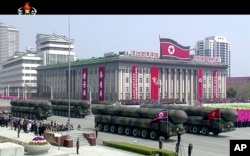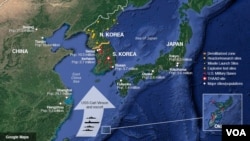In his United Nations General Assembly speech Tuesday, American President Donald Trump said the United States is "ready, willing and able" to "totally destroy" North Korea in response to its "reckless pursuit" of nuclear weapons and ballistic missiles.
His comments come just two days after U.S. Ambassador to the United Nations Nikki Haley said the U.N. Security Council would be "perfectly happy" handing responsibility for dealing with North Korea to the Pentagon. When asked about her comments, U.S. Defense Secretary Jim Mattis on Monday said there are military options the U.S. can take without putting Seoul at great risk, but he declined to go into detail when pressed by reporters.
But regional security analysts Grant Newsham with the Japan Forum for Strategic Studies in Tokyo, and Bong Young-shik with the Yonsei University Institute for North Korean Studies in Seoul have told VOA there are major risks associated with any of the measures that have been publicly discussed.
High risk - military strike
Preemptive U.S. military air or missile strikes to take out North Korean nuclear and missile sites are unlikely to end the nuclear threat, and there is a high risk of deadly counterattacks that could draw China and the entire region into war, say these analysts.
“Really if a military strike or approach is considered, the U.S. had better be ready to go all in and be ready to finish it,” said Newsham, who was interviewed before the latest escalation of tensions.
North Korea has hundreds of mobile missile launchers, many of which are kept in underground bunkers that would be hard to detect and target.
Even if U.S. strikes could destroy all of the country’s nuclear and long-range missile facilities, North Korea could still attack Seoul and other regions near the inter-Korean border with artillery and chemical weapons that could kill millions in South Korea.
By taking unilateral military action against North Korea, the United States would be putting its own security needs ahead of its allies in Asia and would likely trigger a regional political backlash, the analysts said.
“They will put almost all South Korean citizens against the United States because it is totally against the very purpose of the security partnership between the United States and South Korea,” said Bong.
Even limited military actions, these analysts say, could too easily draw the United States into another military quagmire that could cause massive devastation and economic ruin.
No benefit - nuclear allies
Either deploying American nuclear weapons in South Korea and Japan or allowing them to acquire their own may bolster U.S. support for its allies in Asia, but these analysts say they will not likely restrain North Korea.
The United States withdrew tactical nuclear weapons from South Korea in 1991. Subsequently the two Koreas signed an agreement to keep the peninsula free of nuclear weapons.
North Korea later walked away from the agreement, citing the threat of a U.S. invasion.
Analysts say reintroducing nuclear weapons in the South, and deploying them in Japan for the first time, would likely legitimize the North’s nuclear arsenal and justify its efforts to develop long-range ballistic missile deterrence. It would also weaken the international commitment to maintain sanctions against Pyongyang and could spark a global nuclear buildup.
Difficult – effective sanctions
The analysts say imposing real economic pain remains the best of the bad options to restrain North Korea from continuing to develop its nuclear and ballistic missile capabilities.
“You have to put North Korea in a situation where the leadership has to decide between the continuous pursuit of nuclear weapons and missiles, and its survival. And I don’t think North Korea is very close to being forced to make such a big decision,” said Bong.
Despite two recent rounds of stepped up international sanctions, the economic pressure imposed on North Korea has not had a restraining influence so far.
Speaking before the latest sanctions announcements, Newsham said world governments “have allowed the regime to get the money they need to survive and that has always been the regime’s key vulnerability, the need for money.”
The North’s key economic trading partner China is reluctant to strictly implement crippling measures that might destabilize the region or lead to the collapse of its ally.
North Korea has also been able to get around the imposed international restrictions by using companies in friendly countries like China to act as illicit fronts.
Youmi Kim contributed to this report.









